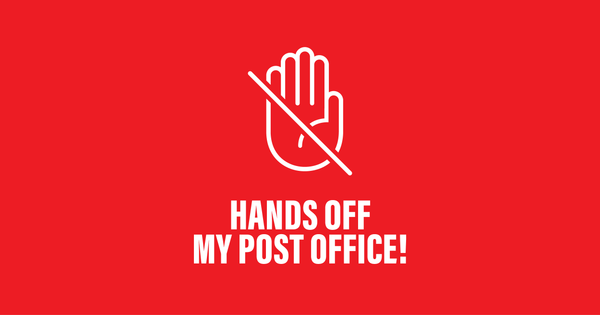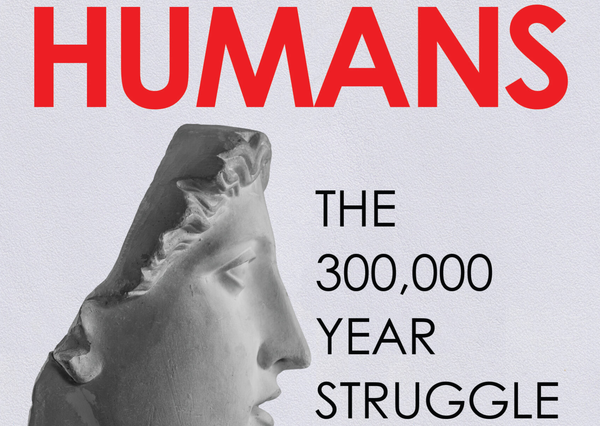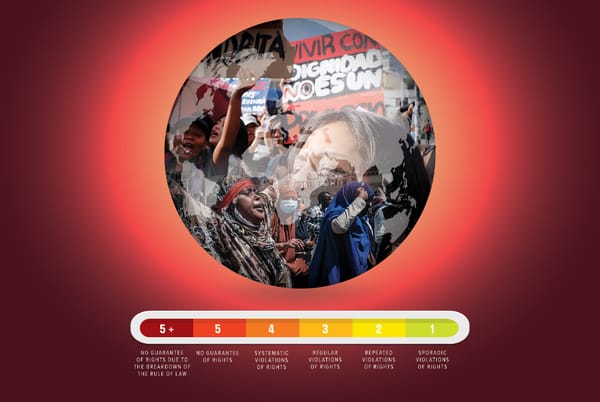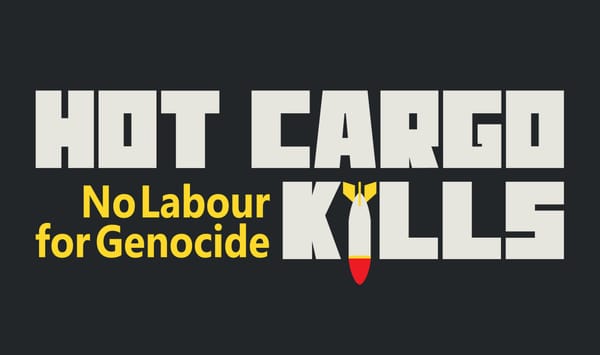As hard as it is for me to believe, this is the 100th edition of Class Struggle! To mark the occasion, I decided to take a look back at 10 installments of the newsletter about which I’m particularly proud.
We’ve covered a lot of ground since the team at Passage sent out our first Class Struggle edition in March 2021. From the pandemic, to inflation, austerity and the post-COVID-19 ‘recovery,’ this newsletter has sought to be a space to centre workers and the labour movement.
If you’d like to help ensure this newsletter continues well into the future, consider becoming a Passage member and/or encouraging your friends to do so.
Now, for your curated list of past Class Struggle issues.
What A Just Reopening That Puts Workers First Would Like Look
March 2021
Class Struggle was born as the COVID-19 pandemic raged and governments oscillated between periods of full and partial restrictions (so-called “lockdowns”) and ill-advised re-openings that often put business interests ahead of worker protections and general public health. In the first edition, I considered what a re-opening that took workers’ rights and safety seriously would entail. In particular, I highlighted the need for universal access to paid sick days, a strong regime of labour standards and health and safety enforcement, and greater access to unionization.
While workers have made some progress on these issues in certain Canadian jurisdictions (paid sick days in British Columbia and the federal jurisdiction, for example), most governments and employers in Canada have been resistant to common sense policies that would improve health and safety and workers’ rights. Even when workers and unions managed to push reforms through, governments catered to business by watering the legislation down. Although a large segment of the general public treats the pandemic as past us, there’s still plenty of work to do to address the COVID-19 fallout and ensure the next emergency doesn’t further cripple our social infrastructure. As a later edition of Class Struggle highlighted, goods jobs are a public health issue. (8-minute read)
The Trucker Convoy Is Not A Workers’ Revolt
February 2022
My take on the so-called “freedom convoy” was the most read installment of Class Struggle. Looking back on it now, this doesn’t surprise me. The pandemic upended so much of our lives while also destroying what remained of a shared political reality. In this context, some of the populist right descended into an ever more dangerous and outlandish death cult, opposed to any public health measure that restricted the inviolable ‘freedom’ to consume and put others’ health at risk. Liberal admonishments to ‘trust the science’ and a general orientation of deference to scientific and political authority failed to grapple with much of what drove the anti-vaxx/anti-mandate contingent. Part of what propels the new right is their ability to capitalize on the economic insecurity many people face by crafting a faux-populist narrative about how an out-of-touch elite is oppressing the masses. In this case, the image of the trucker served their purposes. But as I argued in the newsletter, the anti-lockdown, right-wing ‘cause’ had nothing to do with the real material issues facing truckers. (8-minute read)
The Left Needs A Coherent Response To Right-Wing Populism
March 2021
Speaking of right-populism, labour and the left’s response to this dangerous political phenomenon has been a perennial concern of mine in the newsletter. This early edition examined then-Conservative Party Leader Erin O’Toole’s (remember him?) pitch to workers, as well as the right populist think-tank American Compass’ labour policies. I think the unabashedly anti-labour record of right populists in office — the Trump Presidency and Doug Ford’s government here in Ontario are both good examples — has diminished the populist right’s appeal among workers somewhat. But with Pierre Poilievre at the helm of the federal Conservative Party now, it’s no time to let our guards down. (6-minute read)
The Rich Should Shoulder The Burden Of Inflation, Not Us
July 2022
As pandemic restrictions eased, supply chain constraints, shifts in demand and corporate profiteering coupled a relatively robust economic recovery with the highest inflation observed in 40 years. Disentangling all the causes and consequences of inflation is still an ongoing project subject to much healthy and constructive debate. No matter one’s weighting of the various causes, however, agreement is uniform on the left: the rich should pay the economic and social costs of inflation, not workers who had no part in its emergence or persistence. I published several pieces in Class Struggle dealing with inflation, monetary policy and labour’s response. This particular take I think best encapsulates my position.
If I were to add an addendum now it would be this: a great transfer of wealth took place during the pandemic. Governments took on employers’ responsibility of paying workers, whether through income replacement benefits or through wage subsidies. Workers didn’t pocket that money. They paid landlords, banks and corporations to keep roofs over their heads and to buy the essentials for themselves and their families. If inflation now necessitates sucking money out of the economy, it’s clear where governments should go to get it. (5-minute read)
Reviewing The State Of The Labour Market
November 2022
Every month, Statistics Canada releases its Labour Force Survey, the “jobs report” that gives us a reading on the state of the labour market in Canada. These reports can be relatively dry, but they nevertheless provide an important snapshot of labour’s health. In the newsletter, I’ve periodically given readers a critical take on what’s in the labour force survey, connecting its figures to broader government policies and the dynamics of class struggle in Canada. My last rundown in October, which showed a relatively persistent job market despite the Bank of Canada’s aggressive interest rate hikes, is a good example. In the months since, the Bank has kept its foot on the gas, continuing to raise rates and insisting that the economy is “overheated” and therefore more workers need to be thrown out of their jobs. Although the full-blown recession that I and others anticipated would arrive early this year hasn’t yet come to pass, I fear a major slowdown is still in the offing. This is one time I’d prefer to be wrong. (6-minute read)
Don’t Blame Workers For Refusing To Work Lousy Jobs For Low Pay
May 2021
Along with inflation, the post-pandemic recovery has been dominated by fretting over so-called “labour shortages.” In general, I’ve been very skeptical of the idea that there’s a generalized labour shortage. Particular sectors clearly face a lack of staff (healthcare being the best example), but there’s simply no evidence that the entire labour market faces some type of general shortage. As I argue in this piece, in most cases, what’s really going on is a shortage of good jobs. Employers refusing to improve pay and conditions to attract workers doesn’t constitute a labour shortage. In fact, this is precisely why a tight labour market is a good thing: it improves workers’ bargaining power. (8-minute read)
Canadian Deserve Universal, Public Childcare
August 2021
Public childcare has long been at the top of my political priority list. This edition of Class Struggle on the topic is one of my favourites. It was written after the federal government announced its plan for a national program in its 2021 budget. Since then, agreements have been reached with all the provinces and territories to expand spaces and move toward $10 per day childcare in the coming years. While certain provinces held out and protected private, for-profit providers, on the whole winning a national commitment to affordable childcare is a major accomplishment. As with every social reform, labour and the left will have to keep fighting to ensure the program works. (7-minute read)
Don’t Be Fooled By Businesses Wrapping Themselves In Social Justice Branding
June 2021
This is an example of me turning something that annoys perhaps more than anything into one of my favourite Class Struggle editions. Corporations branding themselves as ‘woke’ or progressive has been a staple of the neoliberal period. It goes hand-in-hand with an ideology that tries to convince people that political expression and change are accomplished primarily through their ‘ethical’ consumption. As it turns out, a lot of companies that claim progressive bona fides also union-bust. Even those who accentuate their supposedly ‘fair’ labour practices often resist unionization. As I wrote in the piece: “Many businesses will be willing to provide ‘fair working conditions’ so long as employers retain total control over setting wages and determining the conditions of work. But allowing bosses to determine ‘fairness’ is no stand-in for collective bargaining. When workers form unions, they introduce a level of freedom and autonomy into the employment relationship. Unionized workers confront the boss as an organized and independent force, creating the space to democratically determine what ‘fairness’ at work looks like. That’s why most bosses hate unions so much. And that’s why they are vital.” (8-minute read)
Climate Change Is Already Killing Workers
July 2021
Right now, federal “just transition” legislation is being hotly debated. Climate change and its impacts on workers are thankfully in the news and on the minds of union leaders and politicians. But as I maintained in this newsletter, there’s a tendency to think of climate impacts as something workers face in the future when, in fact, they are contending with extreme heat and other climate-related issues right now. This piece was written at the height of the heatwave in the Pacific Northwest in 2021 and looked at occupational health and safety standards in Canada and the United States related to extreme weather and temperatures. While most Canadian jurisdictions have decent legislative protections against extreme temperatures, this is a bare minimum. We still need to think about the many ways climate change confronts workers as a pressing issue now. (7-minute read)
How A 5-Month Strike Secured Better Pay For Care Economy Workers
April 2022
Throughout Class Struggle’s lifespan, I’ve tried to highlight the struggles and include the voices of workers and activists. I’ve interviewed union organizers in retail, labour activists fighting Canada’s arms sales and progressive economists and labour scholars. But I’m particularly proud of this interview I did with a striking union member and worker at a Lennox and Addington Interval House, a women’s shelter in my hometown. The interview touches on so many important topics: the struggles of workers in the feminized care sector, the consequences of government wage suppression and the perseverance of workers to fight back and win. In the future, I hope I can include more stories like this one in Class Struggle. These are the stories that inspire me to keep writing and keep fighting. (9-minute read)







